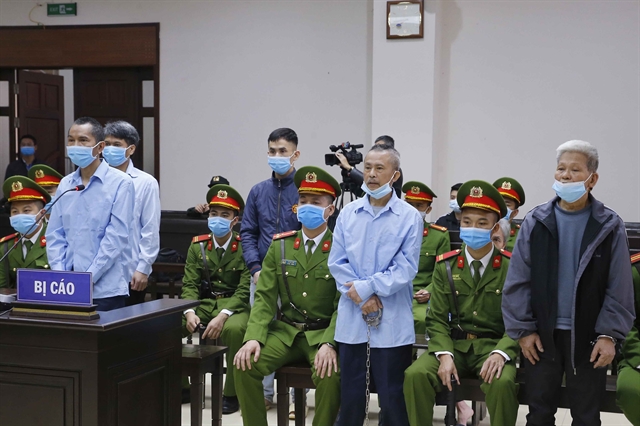
HÀ NỘI — The High-Level People’s Court in Hà Nội on Monday opened the appeal trial of six defendants related to a deadly land dispute in Hoành Village of Đồng Tâm Commune, Hà Nội’s Mỹ Đức District, in January 2020.
At the appeal trial, scheduled to last through March 10, 11 lawyers will represent the defendants and two others will represent the families of the three police officers who died in the incident alongside Lê Đình Kình, an 84-year-old Đồng Tâm resident considered to be the leader of the villagers.
The defendants lodging appeals consist of Lê Đình Công (57 years old), Lê Đình Chức (41 years old), Lê Đình Doanh (33 years old), Bùi Viết Hiểu (78 years old) and Nguyễn Quốc Tiến (41 years old), all of whom claimed the original judgement was too harsh and asked for the consideration of extenuating circumstances in the appellate trial.
In addition, Bùi Thị Nối, 63 years old, rejected the first-instance verdict and filed an appeal.
At the first-instance trial held in September last year, the Hà Nội People’s Court handed down penalties to 29 defendants.
Found guilty of “murder”, Công and Chức were sentenced to death, Doanh got life imprisonment, and Hiểu and Tiến got 16 and 13 years behind bars, respectively.
Accused of “resisting on-duty officers”, 23 other defendants were given sentences of between 15 months’ probation to six years in prison. Among them, Bùi Thị Nối was imprisoned for six years, the severest among those charged with this crime.
According to the first-instance trial’s verdict, the disputed land lot in question was land reserved for national defence purposes, specifically for the construction of the planned military airport Miếu Môn.
However, since 2013, Lê Đình Kình, a former local official, set up the so-called ‘consensus group’ along with Hiểu, Công, Tuyển and others, to incite the residents to appropriate the land and divide it among themselves.
In late 2019, when the Ministry of National Defence announced a plan to erect barriers to protect the land, the group schemed to buy ammunition and weapons to “attack and destroy” the police officers deployed to maintain security and order in the area.
In the early morning of January 9, 2020, when police officers approached Hoành Village, the group and other defendants threw stones, petrol bombs and other flammable materials towards the officers.
The police used speakers to call for the attackers to stop and surrender but to no avail. Three police officers were thrown into a well and had gasoline thrown onto them.
The three officers died due to suffocation and fourth-degree burn injuries, according to the verdict.
This was an extremely serious case in which the defendants’ deeds were extremely dangerous for society, defied and disregarded laws, brazenly infringed upon the State and local authorities’ right activities, and displayed contempt for the lives and health of others, especially those on duty, the verdict reads.
Their deeds were extremely brutal and inhumane when using petrol to burn the three policemen, the jury said, concluding the six defendants guilty of “murder” were the masterminds behind the crime, and they also led and committed criminal acts.
Công was the leader, who often incited resistance, organised meetings, and posted video clips and live-streamed on social networks in which he threatened to kill 300-500 police officers. He also prepared equipment, assigned tasks to other defendants, directed and contributed money to buy petrol and grenades, guided others on how to make petrol bombs and tinder, and personally took part in throwing petrol bombs and grenades toward on-duty officers, according to the verdict.
At the trial today, Công changed his mind and said he was wrongly judged, and that he had no discussions regarding the attack on the police officers with the “consensus group” and that he was unaware of the death of the three police officers until later when someone told him.
He, however, admitted responsibility for buying weapons and throwing petrol bombs and hand grenades and didn’t agree with the murder charge, only the resisting authorities charge.
Judge Ngô Tự Học, who presided over the trial, said as an adult, the defendant should have been aware of how his actions could lead to deaths.
Học said the judges are not forcing the defendant to confess to crimes he did not commit, but asked Công to be frank for leniency to be considered. — VNS